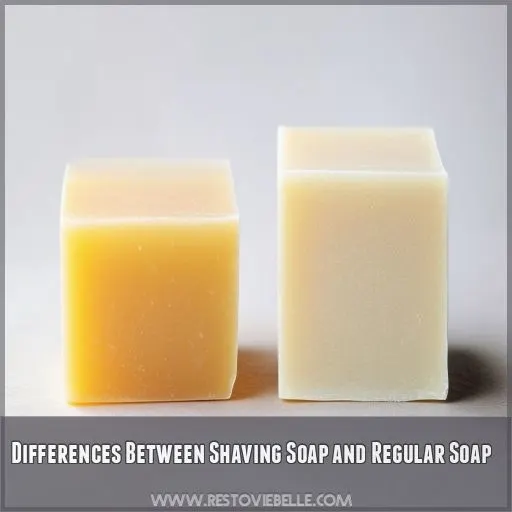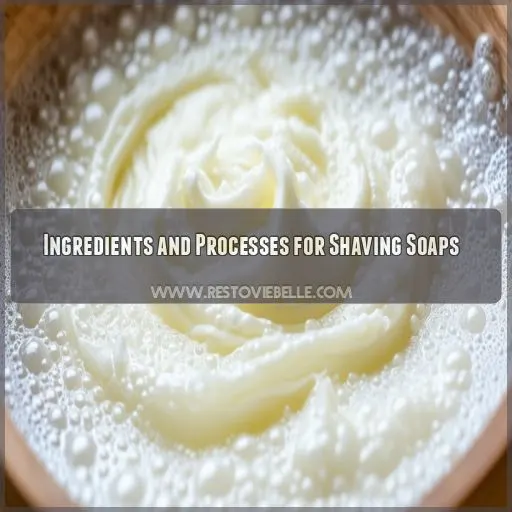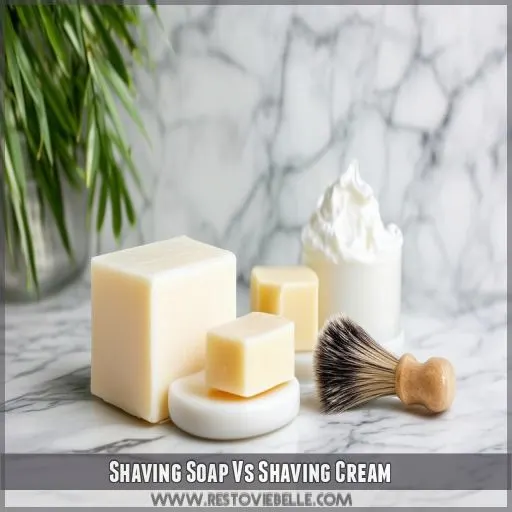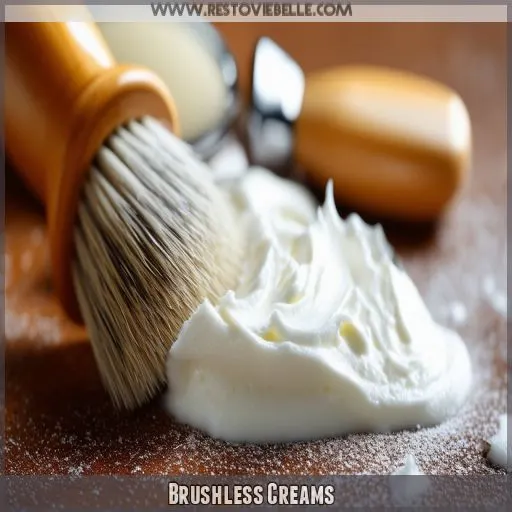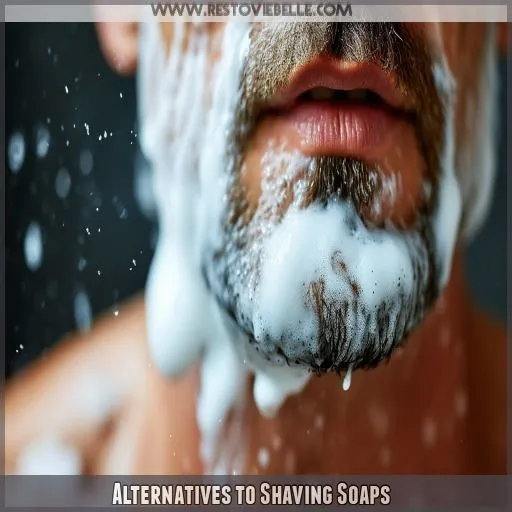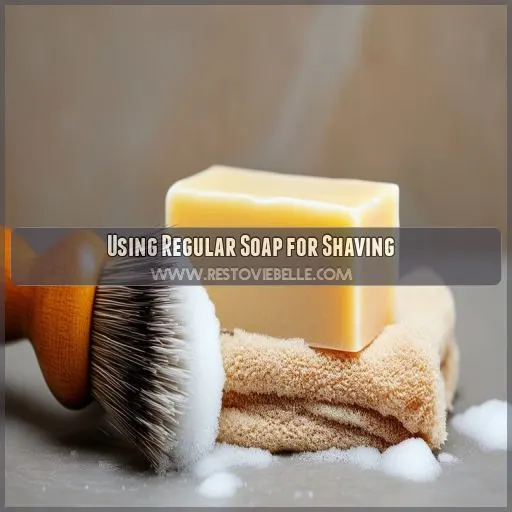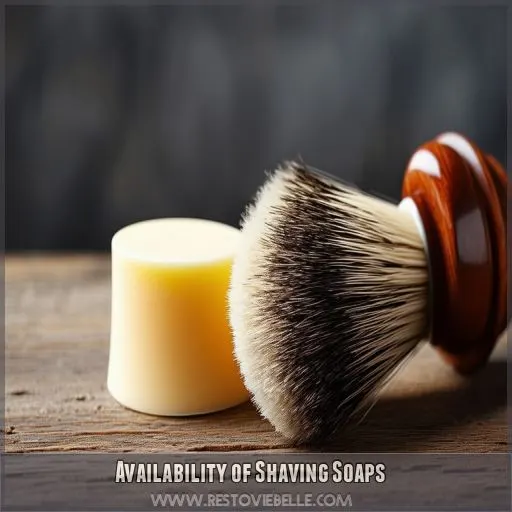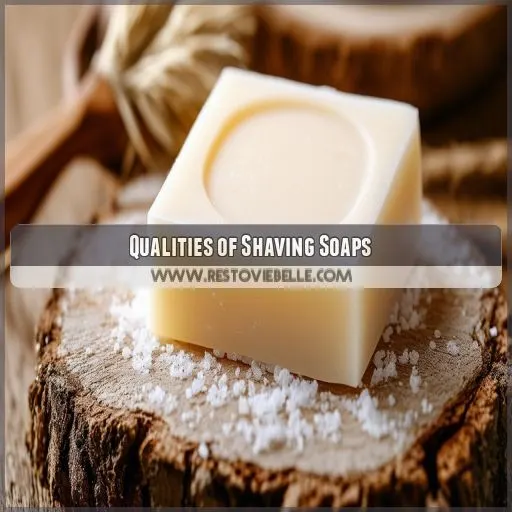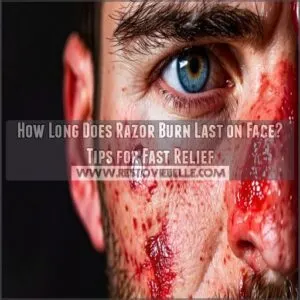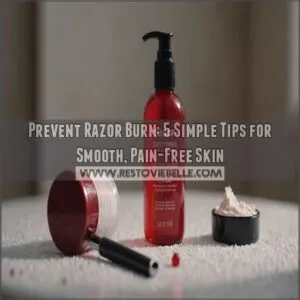This site is supported by our readers. We may earn a commission, at no cost to you, if you purchase through links.
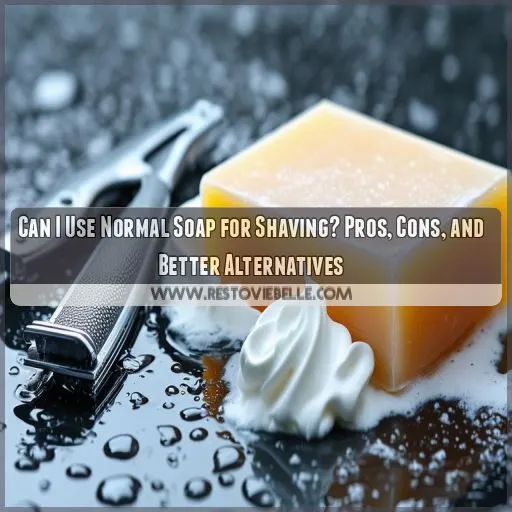 While you can use normal soap for shaving, it’s not the best choice. Regular soap lacks the lather characteristics that shaving soaps provide, such as cushion, slickness, and stability. These qualities are essential for a comfortable, irritation-free shave.
While you can use normal soap for shaving, it’s not the best choice. Regular soap lacks the lather characteristics that shaving soaps provide, such as cushion, slickness, and stability. These qualities are essential for a comfortable, irritation-free shave.
Normal soaps focus on cleaning rather than creating a protective barrier for your skin during shaving. They may also contain harsh ingredients that can dry out or irritate your skin.
Shaving soaps, on the other hand, are specially formulated with moisturizing oils like castor and coconut to create a rich, stable lather that protects and nourishes your skin.
For a better shaving experience, consider exploring dedicated shaving products or alternatives that offer superior performance.
Table Of Contents
- Key Takeaways
- Can I Use Normal Soap for Shaving?
- Differences Between Shaving Soap and Regular Soap
- Ingredients and Processes for Shaving Soaps
- Shaving Soap Vs Shaving Cream
- Brushless Creams
- Croaps
- Alternatives to Shaving Soaps
- Using Regular Soap for Shaving
- Availability of Shaving Soaps
- Qualities of Shaving Soaps
- Frequently Asked Questions (FAQs)
- Is it okay to shave with soap?
- Can you shave with ordinary soap?
- What soap can you use to shave?
- Is shaving soap different than regular soap?
- Can You shave your face with regular soap?
- Do you need a soap bar to shave?
- Should you shave before you lather soap?
- How do you shave with soap?
- What is shaving soap?
- Can you use shaving soap while showering?
- How does water hardness affect soap lather for shaving?
- Can homemade soaps be effective for shaving?
- Are there any skin conditions that require special shaving soaps?
- How do different razor types impact soap choice?
- What role does post-shave skincare play with regular soaps?
- Conclusion
Key Takeaways
- While you can use regular soap in a pinch, it’s like bringing a knife to a gunfight – shaving soaps are specially formulated to create a protective lather that’ll make your razor glide like butter.
- Shaving creams and soaps are the unsung heroes of a smooth shave, packed with moisturizing ingredients that’ll leave your skin feeling fresh as a daisy, unlike regular soap that might leave you high and dry.
- If you’re feeling adventurous, why not give oil shaving a whirl? Almond, jojoba, or olive oil can create a slick surface for your razor, though you might end up smelling like a salad.
- When all else fails and you’re stuck with regular soap, look for glycerin-based options. They’re not perfect, but they’ll do in a pinch – just don’t blame us if your face feels like sandpaper afterward!
Can I Use Normal Soap for Shaving?
Yes, you can use normal soap for shaving, but it’s not ideal. While regular soap may work in a pinch, it doesn’t provide the same lather, lubrication, and skin protection as specialized shaving soaps or creams designed for a smoother, more comfortable shave.
Differences Between Shaving Soap and Regular Soap
When you’re considering using regular soap for shaving, it’s important to understand the key differences. While regular soaps are designed primarily for cleaning, shaving soaps are formulated to create a rich, protective lather with specific characteristics like cushion, slickness, and stability that are essential for a smooth shave.
Shaving Soaps Prioritize Lather Characteristics (cushion, Slickness, Stability)
Regarding shaving soaps, the focus is on the lather. You’ll notice they’re designed with specific characteristics in mind:
- Cushion: Provides a protective barrier
- Slickness: Allows for smooth razor glide
- Stability: Maintains lather throughout your shave
- Moisture: Keeps skin hydrated
The ingredient selection in shaving soaps contributes to these qualities, making them superior to regular soaps for shaving. While they may be pricier, many find the superior lather quality worth the investment.
Regular Soaps Focus on Cleaning
When you reach for regular soap, remember it’s designed with cleaning in mind, not shaving. Unlike shaving soaps that prioritize lather characteristics, regular soaps often contain harsh ingredients that can lead to skin irritation.
While some luxury soaps might offer a rich lather, most aren’t formulated for a smooth shave.
Soft soap or shaving with just water might seem tempting, but they can’t match the protective qualities of using a shaving soap alternative
.
Ingredients and Processes for Shaving Soaps
Shaving soaps often contain key ingredients like castor oil and coconut oil, which contribute to their lathering and moisturizing properties. While the exact manufacturing process may vary between brands, these oils help create the rich, protective lather that’s essential for a smooth shave.
Ingredients: Castor Oil, Coconut Oil
Regarding shaving soap components, you’ll often find coconut and castor oils as the mainstays. These powerful oils work in tandem to generate a luxurious lather that’s gentle on your skin.
Coconut oil offers excellent cleansing properties, while castor oil adds a touch of moisture. Together, they aid in reducing razor burn and provide a smooth glide for your razor.
It’s this winning combination that distinguishes shaving soap from regular soap.
Process: Unknown
While we’re aware of the primary components in shaving soaps, the precise process remains somewhat enigmatic. Many artisans maintain the secrecy of their formulations and techniques.
However, it’s evident that it entails a meticulous combination of ingredients and frequently necessitates experimentation.
The objective? To produce a solid soap that, when agitated in small circles with a shaving brush, generates thick, luxurious lather for a smooth shave.
Shaving Soap Vs Shaving Cream
You’ll find that shaving cream has a softer consistency and lathers more quickly than shaving soap. However, shaving soap generally has a longer shelf life, making it a more economical choice for frequent shavers.
Shaving Cream Has a Softer Consistency Than Shaving Soap
When comparing shaving cream to soap, you’ll notice a stark difference in consistency. Shaving cream’s softer texture makes it a popular choice for many shavers. It’s designed with a specific purpose: to provide a smooth, comfortable shave.
Here are three key points about shaving cream’s consistency:
- Easier to spread on skin
- Requires less water to activate
- Often feels more luxurious on the face
While exploring shaving alternatives, remember that consistency plays an important role in your overall experience.
Shaving Cream Lathers More Quickly
While shaving soap has a firmer consistency, shaving cream offers a quicker lathering experience. You’ll find it’s a breeze to whip up a rich lather in no time. This convenience is perfect for those rushed mornings when every second counts. Let’s compare the lathering speed:
| Factor | Shaving Cream | Shaving Soap |
|---|---|---|
| Time to Lather | 30 seconds | 2-3 minutes |
| Effort Required | Low | Medium |
| Water Needed | Less | More |
| Brush Technique | Simple | Precise |
| Learning Curve | Shallow | Steeper |
Shaving Cream Has a Shorter Longevity Than Shaving Soap
When comparing shaving cream and soap, you’ll notice a significant difference in longevity. Shaving soap outlasts cream, offering more value for your money. Here’s why:
- Lather quality: Soap creates a richer, more stable lather
- Ingredient contrast: Soap’s harder composition preserves it longer
- Price analysis: Despite higher upfront cost, soap’s longevity makes it more economical
While cream offers convenience, its shorter lifespan means you’ll need to replace it more frequently. Consider your priorities when choosing between these options.
Brushless Creams
Brushless creams offer a convenient alternative for those who don’t want to use a shaving brush. While they’re easy to apply, you’ll need to use more product per shave compared to traditional lathering methods.
Do Not Require a Shaving Brush for Lathering
While shaving creams offer quick lathering, brushless creams take convenience a step further. You won’t need a shaving brush with these latherless shaving products.
They’re designed to provide a smooth shave without the traditional lathering process. Many brushless creams incorporate pre-shave oils and post-shave balms, offering a complete solution for razor burn prevention.
It’s a time-saving option for those who prefer a streamlined shaving routine.
Convenient and Easy to Apply
Unlike traditional shaving soaps, brushless creams offer unmatched convenience. You’ll find them easy to apply directly to your face without the need for a brush or lathering ritual.
This time-saving difference makes them perfect for busy mornings or travel. Simply squeeze out the cream, spread it on your skin, and you’re ready to shave.
It’s a hassle-free option for those prioritizing speed and simplicity in their grooming routine.
Require More Product Per Shave
You’ll find brushless creams convenient, but they come with a trade-off. While you can skip the lathering time, you’ll use more product per shave. This affects both cost and effectiveness. The application method is quick, but you might go through the tube faster than traditional soaps. It’s a balance between saving time and potentially spending more on your shaving routine.
Croaps
You might want to contemplate croaps, a hybrid between shaving soap and cream, as an alternative to regular soap for shaving. Croaps offer a consistency that’s easier to lather than hard soaps, while providing longer-lasting performance than typical shaving creams.
Consistency Between Hard Soap and Cream
If you’re looking for a middle ground between shaving soaps and creams, croaps might be your answer. These hybrids offer a unique consistency that’s easier to work with than hard soaps but firmer than creams.
You’ll find croaps strike a balance in texture, making them a popular choice for those who want the best of both worlds.
Their versatility caters to different preferences, giving you more control over your shaving experience.
Easier to Lather Than Hard Soaps
You’ll find croaps a breeze to lather compared to hard soaps. Their unique consistency, somewhere between traditional soap and cream, makes them a favorite among shaving enthusiasts. With simple application techniques, you’ll create a rich lather in no time.
Historically, croaps emerged as a solution to the lather preferences of modern shavers. Their ingredient compositions often reveal a perfect balance for those seeking an easier shaving experience without sacrificing quality.
Longer Longevity Than Shaving Creams
You’ll find croaps offer longer-lasting performance compared to shaving creams, making them an attractive option for cost-conscious shavers. Consider these benefits:
- Extended use per container
- Reduced need for frequent replacements
- Better value for your money
- Simplified travel packing
This long-term performance translates to both economic and environmental advantages. While the initial investment might be higher, you’ll enjoy the benefits of a product that stands the test of time, making your shaving routine more efficient and eco-friendly.
Alternatives to Shaving Soaps
If you’re out of shaving soap, you’ve got options. You can use oils like almond or jojoba, try Yardley English Lavender hand soap, or look for VDH shaving soap at Walmart or Kiss My Face shaving cream at Whole Foods.
Using Oil (almond, Jojoba, Olive)
If you’re looking for an alternative to shaving soap, oils can be a game-changer. Jojoba, almond, and olive oils are popular choices that offer moisturizing benefits.
These natural oils create a protective barrier between your skin and the razor, reducing friction and irritation. They’re especially helpful if you have sensitive skin.
However, remember that oils may not provide the same lathering experience as traditional shaving products, so adjust your technique accordingly.
Yardley English Lavender Hand Soap
If you’re in a pinch, Yardley English Lavender hand soap can be a decent alternative for shaving. This classic soap offers:
- A pleasant lavender scent
- Adequate cushion for your razor
- Decent glide for safety razors
While it’s not specifically designed for shaving, Yardley’s hand soap can provide better results than typical bar soaps. Just remember, it mightn’t offer the same level of protection and moisturizing benefits as dedicated shaving products.
Walmart: VDH Shaving Soap
If you’re looking for an affordable shaving soap, VDH shaving soap at Walmart might be your go-to option. It’s readily available and offers good value for money.
Many users praise its rich lather and smooth shaving experience. While it may not match high-end soaps, VDH’s price point makes it an attractive choice for budget-conscious shavers.
Check user reviews to see if it suits your needs.
Whole Foods: Kiss My Face Shaving Cream
If you’re looking for a quality alternative to traditional shaving soaps, consider Kiss My Face shaving cream, available at Whole Foods. This product offers:
- A smooth, comfortable shave
- Natural ingredients that nourish your skin
- Easy application without the need for a brush
You’ll appreciate the convenience and effectiveness of Kiss My Face shaving cream. It’s a great option for those who want a quick, hassle-free shaving experience without compromising on quality.
Using Regular Soap for Shaving
While you can use regular soap for shaving in a pinch, it’s not ideal as it may not provide the best lather or skin moisturizing benefits that specialized shaving products offer. Some regular soaps, especially those containing olive oil, may interfere with lather formation, but glycerin-based soaps could work better if you’re in a bind.
May Not Provide Optimal Lather or Skin Moisturizing
While alternatives exist, using regular soap for shaving isn’t ideal. You’ll likely find that it doesn’t provide the rich lather or skin-moisturizing benefits of proper shaving soap.
This can lead to a less comfortable shave and potential skin irritation. Regular soap may not soften your facial hair as effectively, making the razor’s job tougher.
If you’re in a pinch, opt for a glycerin soap – it’s gentler on your skin.
Olive Oil May Interfere With Lather
While regular soap may not provide sufficient lather, you’ll face an additional challenge if it contains olive oil.
This ingredient, though great for skin, can hinder lather formation. Shaving soaps are specifically formulated without olive oil to create a rich, protective foam.
If you’re using regular soap, check the ingredients. Olive oil’s presence could leave you with an inadequate shaving experience, increasing the risk of nicks and irritation.
Glycerin-based Soaps May Work Better
While olive oil soaps may hinder lather, you’ll find glycerin-based alternatives work better for shaving. These soaps are less drying and more moisturizing, making them a suitable compromise if you’re in a pinch.
Glycerin helps retain moisture, creating a smoother glide for your razor.
Availability of Shaving Soaps
If you’re in Honolulu, Hawaii, you might find it challenging to locate traditional shaving soaps, as they’ve limited availability in the area. While handmade and glycerin soaps are plentiful, you may need to contemplate ordering from the mainland for a wider selection of specialized shaving products, despite the inconvenience.
Limited Availability in Honolulu, Hawaii
If you’re in Honolulu, Hawaii, you might find it challenging to get your hands on traditional shaving soaps. The availability is limited, which can be frustrating for those with specific preferences.
Don’t worry, though! You’ve got options. While specialized shaving products may be scarce, you’ll discover plenty of alternatives that can work in a pinch.
Keep an eye out for handmade and glycerin-based options, which are more readily available.
Handmade and Glycerin Soaps Are Abundant
While traditional shaving soaps might be scarce, you’ll find a treasure trove of handmade and glycerin soaps in Honolulu. These local alternatives can be your ticket to a smooth shave. Here’s what you need to know:
- Handmade soap options abound in local markets
- Glycerin soap availability is high in specialty shops
- DIY shave soap options let you customize your lather
- Soapmaking workshops teach you to craft your own
- Local soap alternatives often use natural ingredients
Embrace these options to elevate your shaving game and support local artisans.
Ordering From the Mainland is Inconvenient
While handmade and glycerin soaps are readily available, you might find your favorite shaving soap brand harder to come by locally.
Ordering from the mainland can be a hassle, with shipping costs, longer delivery times, and potential import fees or customs issues.
This inconvenience can make it tempting to settle for regular soap, but don’t give up!
There are still ways to get your preferred shaving products without breaking the bank.
Qualities of Shaving Soaps
When choosing a shaving soap, you’ll want to focus on key qualities that enhance your shaving experience. Here are the essential characteristics to look for:
- Lather density: A rich, creamy lather that cushions your skin
- Skin protection: Ingredients that create a barrier between your skin and the razor
- Hair softening: Components that make your beard easier to cut
- Lather longevity: Stability that keeps the lather intact throughout your shave
- Ingredient selection: High-quality oils and moisturizers for superior performance
The best shaving soaps excel in these areas, providing a smooth, comfortable shave. You’ll notice the difference in how easily your razor glides and how protected your skin feels. Don’t settle for a soap that falls short – your face deserves the best! By understanding these qualities, you’re on your way to mastering the art of the perfect shave. Remember, a little investment in quality goes a long way in your grooming routine.
Frequently Asked Questions (FAQs)
Is it okay to shave with soap?
While you can use regular soap for shaving, it’s not ideal. You’ll miss out on the protective lather and moisturizing benefits of shaving soap. It might work in a pinch, but it’s not recommended for regular use.
Can you shave with ordinary soap?
You can shave with ordinary soap, but it’s not ideal. Regular soap lacks the protective lather and moisturizing properties of shaving soap. It may dry your skin and increase irritation. For a smoother shave, consider using proper shaving products.
What soap can you use to shave?
For best shaving, use dedicated shaving soaps or creams. They provide a richer lather, better lubrication, and skin protection. If you’re in a pinch, glycerin-based or moisturizing bar soaps can work, but they’re not ideal for regular use.
Is shaving soap different than regular soap?
Picture a luxurious lather enveloping your face. Yes, shaving soap differs from regular soap. It’s specially formulated to create a rich, protective cushion, reduce friction, and moisturize your skin. You’ll experience a smoother, more comfortable shave with shaving soap.
Can You shave your face with regular soap?
You can shave with regular soap, but it’s not ideal. It won’t provide the same protection and lubrication as shaving soap. You might experience more irritation and cuts. For a smoother shave, consider using proper shaving products.
Do you need a soap bar to shave?
You don’t need a soap bar to shave, but it’s helpful. While you can use regular soap, it’s not ideal. Shaving soap or cream provides better protection, lubrication, and moisture for your skin during the shaving process.
Should you shave before you lather soap?
No, don’t shave before lathering. You’ll want to lather up first to protect your skin. Apply warm water, then work up a rich lather with shaving soap or cream. This creates a protective barrier for a smoother shave.
How do you shave with soap?
Imagine you’re stranded without shaving cream. Don’t panic! Wet your face, lather up soap with warm water, and apply it evenly. Use short, gentle strokes with a sharp razor, rinsing often. Finish with cold water and moisturizer.
What is shaving soap?
Shaving soap is a specialized product designed for a smooth, comfortable shave. It creates a rich, protective lather that softens hair and lubricates your skin, allowing the razor to glide effortlessly. You’ll experience less irritation and a closer shave.
Can you use shaving soap while showering?
Yes, you can use shaving soap while showering. The warm water softens your hair and opens pores, making it easier to lather up and shave. Just be careful not to let the soap wash away too quickly.
How does water hardness affect soap lather for shaving?
Like a delicate dance, water hardness and soap lather waltz together. Hard water makes it tougher to create rich lather, while soft water‘s a dream. You’ll need more elbow grease or specialized soaps in hard water areas for effective shaving results.
Can homemade soaps be effective for shaving?
Homemade soaps can be effective for shaving if you use the right ingredients. Focus on oils like castor and coconut, which create a rich lather. Avoid olive oil, as it can hinder lather formation. Experiment to find your perfect blend.
Are there any skin conditions that require special shaving soaps?
Imagine your skin as a delicate canvas. If you’ve got sensitive skin, eczema, or psoriasis, you’ll need special shaving soaps. These gentle formulas soothe and protect, reducing irritation and inflammation. Don’t settle for regular soap – your skin deserves better care.
How do different razor types impact soap choice?
Your razor type affects soap choice. Safety razors need slicker soaps for smooth gliding. Cartridge razors work well with most soaps. Straight razors require extra-protective lathers. Consider your razor’s design when selecting a shaving soap for effective results.
What role does post-shave skincare play with regular soaps?
Post-shave skincare’s a balm to your razor-weary face. You’ll need extra TLC after using regular soap, as it can leave your skin high and dry. Moisturize thoroughly to soothe irritation and replenish lost hydration.
Conclusion
While you might be tempted to use normal soap for shaving, it’s clear that dedicated shaving products offer superior results. Shaving soaps, creams, and alternatives like oils provide better protection and comfort for your skin.
If you’re in a pinch, glycerin-based soaps can work as a substitute. However, for the best shaving experience, invest in products specifically designed for the task.
They’ll give you the cushion, slickness, and stability you need for a smooth, irritation-free shave. Remember, your skin deserves the extra care.

